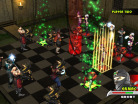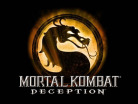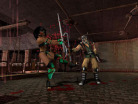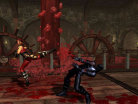- CLASSIC MAGAZINES
- REVIEW CREW
A show recapping what critics thought back
when classic games first came out! - NEXT GENERATION'S BEST & WORST
From the worst 1-star reviews to the best
5-stars can offer, this is Next Generation! - NINTENDO POWER (ARCHIVE)
Experience a variety of shows looking at the
often baffling history of Nintendo Power! - MAGAZINE RETROSPECTIVE
We're looking at the absolutely true history of
some of the most iconic game magazines ever! - SUPER PLAY'S TOP 600
The longest and most ambitious Super NES
countdown on the internet! - THEY SAID WHAT?
Debunking predictions and gossip found
in classic video game magazines! - NEXT GENERATION UNCOVERED
Cyril is back in this spin-off series, featuring the
cover critic review the art of Next Generation! - HARDCORE GAMER MAGAZING (PDF ISSUES)
Download all 36 issues of Hardcore Gamer
Magazine and relive the fun in PDF form!
- REVIEW CREW
- ELECTRONIC GAMING MONTHLY
- ELECTRONIC GAMING MONTHLY RANKS
From Mario to Sonic to Street Fighter, EGM
ranks classic game franchises and consoles! - ELECTRONIC GAMING MONTHLY BEST & WORST
Counting down EGM’s best and worst reviews
going year by year, from 1989 – 2009! - ELECTRONIC GAMING BEST & WORST AWARDS
11-part video series chronicling the ups and
downs of EGM’s Best & Worst Awards!
- ELECTRONIC GAMING MONTHLY RANKS
- GAME HISTORY
- GAME OVER: STORY BREAKDOWNS
Long-running series breaking down game
stories and analyzing their endings! - A BRIEF HISTORY OF GAMING w/ [NAME HERE]
Real history presented in a fun and pithy
format from a variety of game historians! - THE BLACK SHEEP
A series looking back at the black sheep
entries in popular game franchises! - INSTANT EXPERT
Everything you could possibly want to know
about a wide variety of gaming topics! - FREEZE FRAME
When something familiar happens in the games
industry, we're there to take a picture! - I'VE GOT YOUR NUMBER
Learn real video game history through a series
of number-themed episodes, starting at zero! - GREAT MOMENTS IN BAD ACTING
A joyous celebration of some of gaming's
absolute worst voice acting!
- GAME OVER: STORY BREAKDOWNS
- POPULAR SHOWS
- DG NEWS w/ LORNE RISELEY
Newsman Lorne Riseley hosts a regular
series looking at the hottest gaming news! - REVIEW REWIND
Cyril replays a game he reviewed 10+ years
ago to see if he got it right or wrong! - ON-RUNNING FEUDS
Defunct Games' longest-running show, with
editorials, observations and other fun oddities! - DEFUNCT GAMES QUIZ (ARCHIVE)
From online quizzes to game shows, we're
putting your video game knowledge to the test!- QUIZ: ONLINE PASS
Take a weekly quiz to see how well you know
the news and current gaming events! - QUIZ: KNOW THE GAME
One-on-one quiz show where contestants
find out if they actually know classic games! - QUIZ: THE LEADERBOARD
Can you guess the game based on the classic
review? Find out with The Leaderboard!
- QUIZ: ONLINE PASS
- DEFUNCT GAMES VS.
Cyril and the Defunct Games staff isn't afraid
to choose their favorite games and more! - CYRIL READS WORLDS OF POWER
Defunct Games recreates classic game
novelizations through the audio book format!
- DG NEWS w/ LORNE RISELEY
- COMEDY
- GAME EXPECTANCY
How long will your favorite hero live? We crunch
the numbers in this series about dying! - VIDEO GAME ADVICE
Famous game characters answer real personal
advice questions with a humorous slant! - FAKE GAMES: GUERILLA SCRAPBOOK
A long-running series about fake games and
the people who love them (covers included)! - WORST GAME EVER
A contest that attempts to create the worst
video game ever made, complete with covers! - LEVEL 1 STORIES
Literature based on the first stages of some
of your favorite classic video games! - THE COVER CRITIC
One of Defunct Games' earliest shows, Cover
Critic digs up some of the worst box art ever! - COMMERCIAL BREAK
Take a trip through some of the best and
worst video game advertisements of all time! - COMIC BOOK MODS
You've never seen comics like this before.
A curious mix of rewritten video game comics!
- GAME EXPECTANCY
- SERIES ARCHIVE
- NINTENDO SWITCH ONLINE ARCHIVE
A regularly-updated list of every Nintendo
Switch Online release, plus links to review! - PLAYSTATION PLUS CLASSIC ARCHIVE
A comprehensive list of every PlayStation
Plus classic release, including links! - RETRO-BIT PUBLISHING ARCHIVE
A regularly-updated list of every Retro-Bit
game released! - REVIEW MARATHONS w/ ADAM WALLACE
Join critic Adam Wallace as he takes us on a
classic review marathon with different themes!- DEFUNCT GAMES GOLF CLUB
Adam Wallace takes to the links to slice his way
through 72 classic golf game reviews! - 007 IN PIXELS
Adam Wallace takes on the world's greatest spy
as he reviews 15 weeks of James Bond games! - A SALUTE TO VAMPIRES
Adam Wallace is sinking his teeth into a series
covering Castlevania, BloodRayne and more! - CAPCOM'S CURSE
Adam Wallace is celebrating 13 days of Halloween
with a line-up of Capcom's scariest games! - THE FALL OF SUPERMAN
Adam Wallace is a man of steel for playing
some of the absolute worst Superman games! - THE 31 GAMES OF HALLOWEEN
Adam Wallace spends every day of October afraid
as he reviews some of the scariest games ever! - 12 WEEKS OF STAR TREK
Adam Wallace boldly goes where no critic has
gone before in this Star Trek marathon!
- DEFUNCT GAMES GOLF CLUB
- DAYS OF CHRISTMAS (ARCHIVE)
Annual holiday series with themed-episodes
that date all the way back to 2001!- 2015: 30 Ridiculous Retro Rumors
- 2014: 29 Magazines of Christmas
- 2013: 29 Questionable Power-Ups of Christmas
- 2012: 34 Theme Songs of Christmas
- 2011: 32 Game Endings of Christmas
- 2010: 31 Bonus Levels of Christmas
- 2009: 30 Genres of Christmas
- 2008: 29 Controls of Christmas
- 2007: 34 Cliches of Christmas
- 2006: 33 Consoles of Christmas
- 2005: 32 Articles of Christmas
- 2004: 31 Websites of Christmas
- 2003: 29 Issues of Christmas
- 2002: 28 Years of Christmas
- 2001: 33 Days of Christmas
- NINTENDO SWITCH ONLINE ARCHIVE
- REVIEW ARCHIVE
- FULL ARCHIVE
Mortal Kombat: Deception
You're never quite sure what you're going to get when it comes to a Midway fighting game. Is it going to be a bona fide classic, like Mortal Kombat II; or a full-on disaster, like War Gods, Primal Rage, or Mortal Kombat Advance? Loyal fans have been through the worst of times; they deserve a sequel that delivers on all the potential created a dozen years ago.
Mortal Kombat Deception might not end up being everything the fans have been waiting for, but it comes pretty darn close. After all these years, and an extremely awkward jump from 2D to 3D, Mortal Kombat is better than ever with more extra modes, characters, levels, and surprises than you can shake a giant spear at.
The game play is largely unchanged from that of Deadly Alliance two years ago. Each combatant is offered three different fighting styles, one of which includes their own weapon. New to Deception is a combo breaker, a move that will stop just about any series of attacks, but can only be used three times per match. This, along with a few other minor upgrades and additions, makes Deception the best playing Mortal Kombat game since its launch a dozen years ago.
But no matter how good it plays by Mortal Kombat standards, the fighting system still feels years behind the likes of Virtua Fighter 4 or Soul Calibur II. The moves, especially punches and kicks, look clumsy at best, the animation lacks any kind of smoothness or finesse, and I've never been a fan of the whole dial-a-combo system Midway insists on including in their games. But even with better playing fighters on the market (for a fraction of the price), Deception manages to feel different; for better or for worse, this plays exactly like a Mortal Kombat game should.
Where Deception really takes hold is in its amazing level designs. Not only are these stages dark and eerie, but they are also extremely large and full of surprises. Like Dead or Alive 3, Deception's levels extend farther than just one room, you can break through walls, fall off roofs, and much more. Using the environment to your advantage is a major part in this Mortal Kombat, and is easily one of the most rewarding aspects of the game.
Not only has Midway added a bunch of new levels, but also brought back some of the best-loved stages from previous Mortal Kombat games. The acid pool level from Mortal Kombat II is reintroduced for a new generation, except this time you won't have to wait until the end of the match to kick your opponent into the acid. Each level has a set of unique traps that can literally stop a match dead in its tracks. There is a new pit level, but this time around the stage is doing everything in its power to make you fall to your demise. These traps are especially effective when playing against unsuspecting friends, and really add to the over all chaos found in Deception.
There are 24 characters to choose from, 12 from the start and 12 you're going to need to earn. Along side the returning characters, like Sub Zero and Scorpion, are a bevy of new fighters. There's Ashrah who looks like a female Raiden, but has a few surprises up her blouse. Hotaru looks cool and is sporting flags, but seems to be limited by only having two special moves. And then there's tough girl Kira and tough guy Darrius taking the place of Sonya and Jax, but not really adding much to the roster. The new characters are fun to play with, but they just don't seem as interesting or creative as some of the past combatants.
Of course, it's not all new characters in Deception, as a lot of past favorites make their first 3D appearance. Here we have the return of Baraka, one of the most popular characters from Mortal Kombat II. He still sports the long blades that jet out of his arms (think: Wolverine, except with long swords), but somehow a lot of the brutality has worn off. I had similar problems with some of the returning Ninjas, like Ermac, Smoke, and Noob Saibot, who just didn't do much for me this time around.
Deception also plays host to the return of Nightwolf, the Native American character that seemed to embody every bad stereotype you could think of. Kabal also finds his way into Deception, but like Nightwolf, just seems very out of place in this Mortal Kombat universe. Ultimately these characters add very little and don't warrant leaving out many of the best characters from Dark Alliance, like Kung Lao, Kano, Reptile, and others.
Even if there aren't all the characters I could hope for, at least they feature more fatalities and special moves than ever before. Unlike Dark Alliance which only featured one fatality per character, here all of the fighters have two different finishing moves. For the most part these fatalities are better, and of course gorier, than those found in past Mortal Kombat games. New to Deception is the Hara-kiri, which allows the dead party to end their own life before the other person has time to finish them.
Being a Mortal Kombat sequel you'd expect a great deal of hidden items, and Deception is not going to let you down. The problem is, to earn these extra characters, stages, and costumes you're going to have to endure the Konquest mode, a painfully boring adventure mode that can't decide whether it wants to be an exciting quest or a straight up tutorial. Early in the game you are given access to a portal that will take you to various realms of this Mortal Kombat universe - Earthrealm, Chaosrealm, Netherrealm, etc. - where you will solve mysteries, fight aggressors, and constantly train. You see, most of the Konquest mode is made up of you learning every move, combo, and throw for every single character in the game. It's one tutorial after another, painfully ripping all the fun out of what should be an exciting bonus feature.
When you're not learning how to perform a 12-hit combo you can search around the various realms for hidden items, treasure chests, and floating Kombat Koins. You can also talk to the town folk and see if they are in need of your help, usually resulting in a quest to find a specific item or deliver something. You can also challenge various Mortal Kombat figures scattered throughout the realms; here you will be forced to fight under their rules, which generally gives them an unfair advantage.
I like the idea of the Konquest mode, and found myself having a pretty good time with it after the various tutorials were over, but I can't help but notice that there's some unmet potential here. This mode could have fleshed out the various levels you fight in, or offer some depth into the history of the Mortal Kombat universe, but instead it feels tacked at the last minute. It also looks horrible! The various objects use extremely simple textures, and most of the realms are pretty boring to look at. I suppose the graphics get the job done, but for not much more than minimum wage.
The good thing about the Konquest mode is that when you grow tired of doing the same thing over and over, you can always move on to any one of the other slightly out of place extra modes. Puzzle Fighter, for example, is a perfectly good rip-off of Super Puzzle Fighter II Turbo that you can take online. Like Capcom's puzzler you choose from a limited selection of Mortal Kombat characters, which fight at the bottom of the screen while you try to eliminate various blocks and colors. The result is humorous, especially when you see how they've adapted the levels, but Puzzle Kombat is not nearly as addictive as the puzzle games it's playing homage to.
You can also try your hand at Chess Kombat, which combines the game play of classic games like Archon and Battle Chess with the button mashing that is Mortal Kombat Deception. Although not completely original, there's something fun about playing Chess with Mortal Kombat pieces. There is enough new here to warrant more than a few plays, especially with friends.
But at the end of the day, the more rewarding new feature in Deception is not a gimmick or a bonus game, but rather the addition of Xbox Live support. Although the Xbox Live has been around for a couple of years now, Mortal Kombat Deception is the very first 3D fighting game to allow you to play gamers anywhere in the world. While I did run into a few games plagued with laggy connections, my experience online was usually pretty stable, and a whole lot of fun. Fighting games have always been meant to be played against real people, and with online play you should always be able to find somebody to fight with.
Even with a few faults, Mortal Kombat Deception has a lot going for it. There is quite a bit to collect in the game, a number of fun multi-player modes, and an online component you'll keep coming back to day after day. I wish the fighting system was a little tighter and didn't feel so much like button mashing, but generally speaking, this is a step in the right direction for Mortal Kombat.
HOME |
CONTACT |
NOW HIRING |
WHAT IS DEFUNCT GAMES? |
NINTENDO SWITCH ONLINE |
RETRO-BIT PUBLISHING
Retro-Bit |
Switch Planet |
The Halcyon Show |
Same Name, Different Game |
Dragnix |
Press the Buttons
Game Zone Online | Hardcore Gamer | The Dreamcast Junkyard | Video Game Blogger
Dr Strife | Games For Lunch | Mondo Cool Cast | Boxed Pixels | Sega CD Universe | Gaming Trend
Game Zone Online | Hardcore Gamer | The Dreamcast Junkyard | Video Game Blogger
Dr Strife | Games For Lunch | Mondo Cool Cast | Boxed Pixels | Sega CD Universe | Gaming Trend
Copyright © 2001-2025 Defunct Games
All rights reserved. All trademarks are properties of their respective owners.
All rights reserved. All trademarks are properties of their respective owners.





























